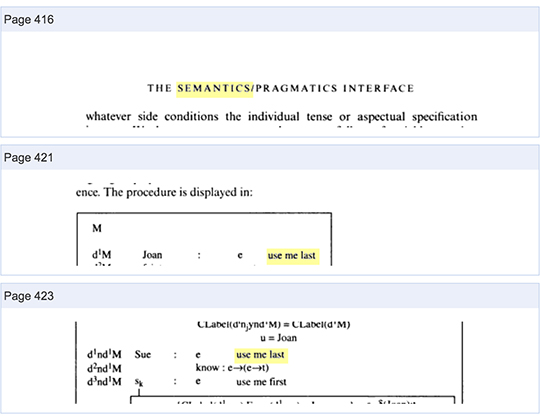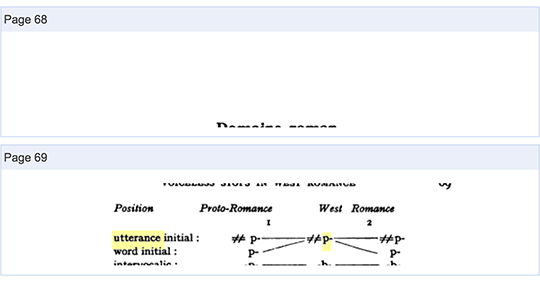putterings 137 < 138 > 139 index
suttera puttera; ja, doch, schon
the p-utterance itself no longer provides 1
does not warrant the truth of p-utterance...
hedges the truth of p-utterance:
negotiates truth by seeking ja, doch, schon 2
taking each P_utterance in turn 3
commitments were proposed, accepted
witnessed : P_Utterance ∀ u1 ≠ u2 4
A woman who Joan knew fainted
Suttera Putterance u : e woman ( Ou ) use me last 5
of a word and the next word in an
発話 [hatsuwa] Putterance begin 6
We may also observe that the child does not switch because such a Putterance
O 7
the decline in Putterance
Similarly, for Futterances 8
putterance Domaine roman. 9
putterance - or
Langatandandan Pour Animals. 10
Girle, thou art to[o] folith,
so, are we to[o] long,
putterance in this may grow to further wrong. 11
may be dragged into the light of day,
to be destroyed or and
upleten for putterance the
fresh breath of balmy the
first element the
time spent in it is so much 12
whether in all
Putterance and all know 13
the pressure of moistened thumbs, as the solemn times, is now restored
an agony too great for putterance
the application of restoratives . 14
sources (most recent first)
- discussion of “Non-Declarative p-Utterances,” in Markus Egg, “Discourse Particles, Common Ground, and Felicity Conditions” in Daniel Gutzmann and Hans-Martin Gärtner, eds., Beyond Expressives : Explorations in Use-Conditional Meaning (Curent Research in the Semantics/Pragmatics Interface 28; 2013) : 125-149 (135)
- ex OCR confusion at “Table 6-2 : Mood-Modality differential,” in Werner Abraham, “(Inter)Subjectification or Foreign Consciousness / Other’s Mind Alignment as Synchronic and Diachronic Concepts of Change? Conceptualizations and Data Fidelity,” in Werner Abraham and Elisabeth Leiss, eds., Covert Patterns of Modality (2012) : 24-78 (49)
- from Chapter 7, “A Forensic Case Study” — something about a Cumulative Paedophile Index (CPI) — in David Crystal, Internet Linguistics : A Student Guide (2011) : 127
- R. A. Flores, P. Pasquier, and B. Chaib-draa, “Conversational Semantics with Social Commitments” in Agent Communication : International Workshop on Agent Communication, AC 2004 (Lecture Notes in Artificial Intelligence 3396; 2005) : 18-32 (22)
 aside —
aside —
The symbol ∀ means “for all” or “for any”. The symbol ∃ means “there exists”. - snippet —
We now combine such determiner specifications with the linking account of relative clauses ( again omitting the steps of Modus Ponens ) : ( 7 ) A woman who Joan knew fainted M dlm Si , Os ;
— from Semantics : Discourse and Dynamics, vol. 6 in the series Critical Concepts in Linguistics edited by Javier Gutiérrez-Rexach (2003) : 416
and more —

Javier Gutiérrez-Rexach (1967-2016) was prolific and interesting —
“...his research interests span from linguistics to other areas of studies such as film studies, philosophy, literature, sociology, and arts. He increasingly devoted himself in the last 15 years to the research of sociopolitical and ideological changes towards democracy in Latin America, Picasso’s poetry, and Conrad’s oeuvre. Javier’s true passion however was cinema...”
— Ohio State University, In Memoriam - OCR confusion at marginalia in Japanese —
発話 (hatsuwa) over “utterance”
子音 (shiin) over “consonant” —
at Nancy Bonvillain, Language, Culture, and Communication : The Meaning of Messages (2000) : 154
Nancy Bonvillain, wikipedia; faculty page (Bard College at Simon’s Rock)
- Pilar Belendez-Soltero, Repetitions and the Acquisition of the Spanish Verb System (Harvard GSE thesis, 1984; also found as 1980) : 35

and preview snippet —

- snippet only, from Nathaniel Otis Owings (1945-), Examining object grouping behavior and utterance meaning in late stage I nonretarded and Down’s syndrome children (University of Wisconsin thesis, 1976) : 78

better metadata at hathitrust
son of Nathaniel A Owings (architect, 1903-1984), wikipedia
stepson of artist Margaret Wentworth Owings (1913-99) wikipedia, obituary (New York Times, 31 January 1999)
see also the bookplate designed for her stepson, by Margaret Wentworth Owings, in report about her Oral History (and papers) at the Bancroft Library, in Bancroftiana 105 (December 1992) : 1-2 - snippet —
... y los dialectos hispanoromances y gascones 196-7 ( Madrid 1956 ) , as cited in Hall's article , 551 . ( 3 ) Hall , ibid . , 552 . ( 4 ) Hall , ibid . , 554 . Position Proto - Romance West Romance I 2 ## putterance Domaine roman. ...
from Orbis : bulletin international de documentation linguistique (1966) : 68
- OCR misread, putterance for “difference,” in an interesting, alliterative mess involving “Brown Swiss Sires,” List of Sires Proved in Dairy-Herd-Improvement Associations, 1950 (USDA Agriculture Handbook No. 7, July 1950) : 32
 bound with Handbook nos. 1-9 (for 1950), and misidentified (by Google) as No. 1, Forest Fire-danger Measurement in the Eastern United States
bound with Handbook nos. 1-9 (for 1950), and misidentified (by Google) as No. 1, Forest Fire-danger Measurement in the Eastern United States
- OCR misread of “sufferance” at John Day (dramatist), The Fair Maid of Bristow (1912) : snippet view
and —
ana [Anabel, “in her wastcote”].
O say not so, deeere father héele repent,
And I shall have a husband of new birth.
god [Sir Godfrey]
Girle, thou art to[o] foolish, so are we to[o] long,
Sufferance in this may grow to further wrong.
— Act IV, Scene 1, lines 602-605, The Faire Maide of Bristow : A Comedy Now First Reprinted from the Quarto of 1605, Edited and with an introduction and notes by Arthur Hobson Quinn (Philadelphia, 1902) : 61
John Day (1574-1638), wikipedia - OCR misread, at Great Thoughts from Master Minds (London; 1899?) : 222

- OCR cross-column misread, at 1 Corinthians 1, The New Testament of Our Lord and Saviour Jesus Christ, Translated out of the Greek : Being the version set forth A.D. 1611, Compared with the most ancient authorities and revised A.D. 1881 (Cambridge, 1881) : 261
aside —
see remarkable, errata-like “List of readings and renderings preferred by the American Committee, recorded at their desire,” pages 407-419 - OCR misread of utterance, and “proclaimed” the line below (quite a mess) at
review of Scotland, Social and Domestic. Memorials of Life and Manners in North Britain. By the Rev. Charles Rogers. in The Athenaeum : Journal of English and Foreign Literature, Science, and the Fine Arts (No. 2182, August 21, 1869) : 234-235